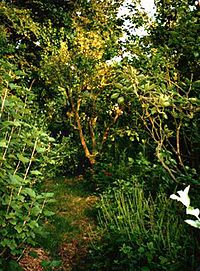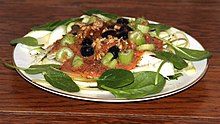Raw veganism: Difference between revisions
Hawaiisunfun (talk | contribs) m →Contamination: edited out grammar issues |
Hawaiisunfun (talk | contribs) m →Adulteration: removed a section that is already referenced in the contamination section |
||
| Line 22: | Line 22: | ||
===Adulteration=== |
===Adulteration=== |
||
[[Adulterant|Adulteration]] is a concern for spices that are imported from locations with substandard regulations for hygienic food preparation.<ref name="fao">{{cite web |title=Code of Hygienic Practice |url=http://www.fao.org/fao-who-codexalimentarius/sh-proxy/en/?lnk=1&url=https%253A%252F%252Fworkspace.fao.org%252Fsites%252Fcodex%252FStandards%252FCAC%2BRCP%2B1-1969%252FCXP_001e.pdf |publisher=United Nations, Food and Agriculture Organization|accessdate=15 December 2018}}</ref> Cooking may not eliminate adulterants |
[[Adulterant|Adulteration]] is a concern for spices that are imported from locations with substandard regulations for hygienic food preparation.<ref name="fao">{{cite web |title=Code of Hygienic Practice |url=http://www.fao.org/fao-who-codexalimentarius/sh-proxy/en/?lnk=1&url=https%253A%252F%252Fworkspace.fao.org%252Fsites%252Fcodex%252FStandards%252FCAC%2BRCP%2B1-1969%252FCXP_001e.pdf |publisher=United Nations, Food and Agriculture Organization|accessdate=15 December 2018}}</ref> Cooking may not eliminate adulterants.<ref name=fao/><ref name="kumar">{{cite journal | last=Kumar | first=Pradeep | last2=Mahato | first2=Dipendra K. | last3=Kamle | first3=Madhu | last4=Mohanta | first4=Tapan K. | last5=Kang | first5=Sang G. | title=Aflatoxins: A Global Concern for Food Safety, Human Health and Their Management | journal=Frontiers in Microbiology | volume=07 | pages=2170 | date=2017-01-17 | issn=1664-302X | pmid=28144235 | pmc=5240007 | doi=10.3389/fmicb.2016.02170}}</ref> |
||
==See also== |
==See also== |
||
Revision as of 23:33, 30 July 2020
It has been suggested that this article be merged with Raw foodism. (Discuss) Proposed since July 2020. |
This article needs more reliable medical references for verification or relies too heavily on primary sources. (July 2020) |  |

Raw veganism is a diet that combines the concepts of veganism and raw foodism. It excludes all products of animal origin and food cooked at high temperatures (above 118F[1]). Raw veganism has rarely been practiced in history,[2] but it has become more of a trend recently.[3]
History
Early, pliocene hominids (like australopithecines), who split from apes around 4.4 million years ago, ate "buds, flowers, and shoots", and some soft fruit, as their teeth couldn't process meat (which is a "tough, pliant food").[4]
Germans brought raw veganism to Southern California in the 1800s.[1] Raw Food Dining Room, the world's first raw vegan restaurant (but no longer in existence), opened in Los Angeles, California in 1918 by John and Vera Richter[5].
Robert Hart practiced raw veganism from forest gardening as a food production system based on woodland ecosystems incorporating fruit and nut trees, shrubs, herbs, vines, and perennial vegetables.[6][7] Forest gardens are a resilient agroecosystem.[8]

Benefits
Heat processing foods degrades water-soluble vitamins, and enzymes, heat-sensitive nutrients (like carotenoids and fiber), which increases the availability of carcinogens, and initiates the Maillard reaction to make food hard digest and thus more inflammatory.[1] Carcinogens form in the cooking process, like AGEs[9], PAHs[10], and HAs[11]. These can induce a multitude of health risks when consumed (through eating or breathing in[12]).
Concerns
The British Dietetic Association named the raw vegan diet one of the "top 5 worst celeb diets to avoid in 2018", raising a concern that it could compromise long-term health.[13]
Contamination
Food-borne outbreaks from bacterial, viral or parasitic infections, zoonotic or human,[14] are caused by consumption of microorganism-contaminated raw herbs and spices,[15] fruits, vegetables, or other plant foods.[16][17] The US Food and Drug Administration recommends cooking when possible to kill microorganisms in raw plant foods.[18][19]
Adulteration
Adulteration is a concern for spices that are imported from locations with substandard regulations for hygienic food preparation.[20] Cooking may not eliminate adulterants.[20][21]
See also
References
- ^ a b c Link, Lilli B.; Jacobson, Judith S. (2008-2). "Factors affecting adherence to a raw vegan diet". Complementary therapies in clinical practice. 14 (1): 53–59. doi:10.1016/j.ctcp.2006.12.005. ISSN 1744-3881. PMC 3635096. PMID 18243943.
{{cite journal}}: Check date values in:|date=(help) - ^ Fontana, Luigi; Shew, Jennifer L.; Holloszy, John O.; Villareal, Dennis T. (2005-03-28). "Low Bone Mass in Subjects on a Long-term Raw Vegetarian Diet". Archives of Internal Medicine. 165 (6): 684–9. doi:10.1001/archinte.165.6.684. ISSN 0003-9926. PMID 15795346.
- ^ Kamiński, Mikołaj; Skonieczna-Żydecka, Karolina; Nowak, Jan Krzysztof; Stachowska, Ewa (2020-02-12). "Global and local diet popularity rankings, their secular trends and seasonal variation in Google Trends data". Nutrition: 110759. doi:10.1016/j.nut.2020.110759. ISSN 0899-9007.
- ^ Teaford, Mark (October 5, 2000). "Diet and the evolution of the earliest human ancestors" (PDF). PNAS. 97: 13506–13511.
- ^ Meares, Hadley (6 June 2020). "L.A. Has Been Eating Raw Vegan Food Since 1918, Thanks to This Communist, Feminist Angeleno". Retrieved 19 February 2019.
{{cite web}}: CS1 maint: url-status (link) - ^ Robert Hart (1996). Forest Gardening. Chelsea Green Publishing. ISBN 978-1603580502.
- ^ Patrick Whitefield (2002). How to Make a Forest Garden. Permanent Publications. p. 5. ISBN 978-1856230087.
- ^ Douglas John McConnell (2003). The Forest Farms of Kandy: And Other Gardens of Complete Design. Ashgate. p. 1. ISBN 978-0754609582.
- ^ URIBARRI, JAIME; WOODRUFF, SANDRA; GOODMAN, SUSAN; CAI, WEIJING; CHEN, XUE; PYZIK, RENATA; YONG, ANGIE; STRIKER, GARY E.; VLASSARA, HELEN (2010-6). "Advanced Glycation End Products in Foods and a Practical Guide to Their Reduction in the Diet". Journal of the American Dietetic Association. 110 (6): 911–16.e12. doi:10.1016/j.jada.2010.03.018. ISSN 0002-8223. PMC 3704564. PMID 20497781.
{{cite journal}}: Check date values in:|date=(help) - ^ Yoon, Eunkyung; Park, Kyungah; Lee, Hyomin; Yang, Jae-Ho; Lee, Cherlho (2007-05-16). "Estimation of Excess Cancer Risk on Time-Weighted Lifetime Average Daily Intake of PAHs from Food Ingestion". Human and Ecological Risk Assessment: An International Journal. 13 (3): 669–680. doi:10.1080/10807030701226871. ISSN 1080-7039.
- ^ Ohgaki, Hiroko; Takayama, Shozo; Sugimura, Takashi (1991-03-01). "Carcinogenicities of heterocyclic amines in cooked food". Mutation Research/Genetic Toxicology. 259 (3): 399–410. doi:10.1016/0165-1218(91)90130-E. ISSN 0165-1218.
- ^ Lewtas, Joellen (17 August 2007). "Air pollution combustion emissions: Characterization of causative agents and mechanisms associated with cancer, reproductive, and cardiovascular effects". Mutation Research. 636: 95–133 – via Elsevier Science Direct.
- ^ "Top 5 worst celeb diets to avoid in 2018". British Dietetic Association. 7 December 2017.
The British Dietetic Association (BDA) today revealed its much-anticipated annual list of celebrity diets to avoid in 2018. The line-up this year includes Raw Vegan, Alkaline, Pioppi and Ketogenic diets as well as Katie Price's Nutritional Supplements.
- ^ "Salmonella and Tomatoes" (PDF). U.S. Department of Agriculture. Retrieved 7 June 2020.
{{cite web}}: CS1 maint: url-status (link) - ^ "Risk Profile: Pathogens and Filth in Spices". US Food and Drug Administration. Retrieved 15 December 2018.
- ^ "Foodborne illnesses". National Institute of Diabetes and Digestive and Kidney Diseases, US National Institutes of Health. 2010-02-01. Retrieved 2018-12-16.
- ^ Erickson, Marilyn C.; Doyle, Michael P. (2012). "Plant food safety issues: Linking production agriculture a one health approach: Workshop summary". US Institute of Medicine; Washington (DC): National Academies Press. Retrieved 2018-12-16.
- ^ "Rarely Consumed Raw Produce. Produce Safety Rule (21 CFR 112)" (PDF). US Food and Drug Administration. Retrieved 15 December 2018.
- ^ "What the Produce Safety Rule Means for Consumers". US Food and Drug Administration. Retrieved 15 December 2018.
- ^ a b "Code of Hygienic Practice" (PDF). United Nations, Food and Agriculture Organization. Retrieved 15 December 2018.
- ^ Kumar, Pradeep; Mahato, Dipendra K.; Kamle, Madhu; Mohanta, Tapan K.; Kang, Sang G. (2017-01-17). "Aflatoxins: A Global Concern for Food Safety, Human Health and Their Management". Frontiers in Microbiology. 07: 2170. doi:10.3389/fmicb.2016.02170. ISSN 1664-302X. PMC 5240007. PMID 28144235.
{{cite journal}}: CS1 maint: unflagged free DOI (link)
